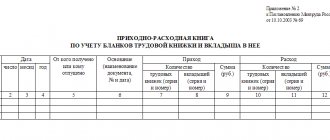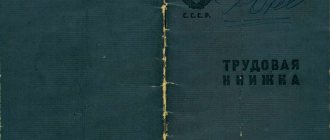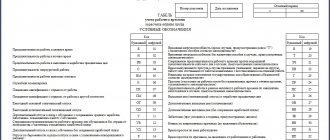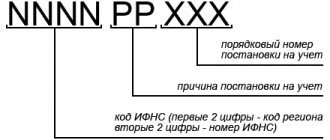How to fill it out correctly
The rules and procedure for maintaining and storing work books and making entries in them are strictly regulated by Decree of the Ministry of Labor of Russia dated October 10, 2003 No. 69. Fill out by hand with a black, blue or purple pen; using a pencil or marker to fill out is not allowed. All words are spelled out in full; abbreviations are not allowed. The work book contains:
- information about the employee or title page: full name, date of birth, level of education, profession or specialty, date of filling out the title page;
- information about the job, which includes information about hiring, movements within the organization, part-time work, including external, if the employee provides such information, dismissal;
- information about awards.
IMPORTANT!
Since 2015, stamps are not required for limited liability companies and joint-stock companies, and therefore, on October 31, 2016, the Ministry of Labor issued Order No. 589n, which clarified the issue of affixing stamps to personnel documents. A seal is required if the organization has one and is approved by the constituent documents. If there is no seal, the papers are filled out without it.
Upon dismissal
In the event of termination of an official relationship with an employee, the employer is obliged to issue him a work book on the last day of work of the subordinate. If the latter is absent from the workplace for a certain reason, the manager is obliged to send him a notice of receipt of the work permit or of consent to send this document by mail. This needs to be remembered.
When an employee is dismissed, the work book must be issued to the employee along with the final payment. That's how it's supposed to be by law.
Upon written request from an employee who has not received a work permit, the employer is obliged to issue it no later than three days from the date of the latter’s request. Otherwise, the employee may file a complaint with the prosecutor’s office and even the court.
Who purchases a work book form
Personal personnel papers are strictly accountable documents and are purchased by employers. The procedure for providing employers with these forms is established by Order of the Ministry of Finance No. 117n dated December 22, 2003. It says that the only organization that has the right to produce forms is the GOZNAK association of the Ministry of Finance of the Russian Federation. Only specialized distributors approved by GOZNAK have the right to supply forms to users.
If a citizen does not have a work permit, the employer provides him with a blank form; if it is completely filled out, an insert form.
The costs of the forms are included in the company's expenses: Debit 20, 26, 44 Credit 60. Cost of the document provided to the employee:
- is compensated by depositing the appropriate amount into the organization’s cash desk;
- deducted from the employee's salary.
Responsibility for failure to comply with the procedure for handling work books
Article 292 of the Criminal Code of the Russian Federation (“Forgery of Officials”) establishes liability for the introduction by an official of knowingly false information into official documents, as well as for the introduction of corrections into these documents that distort their actual content, if these acts were committed out of selfish or other personal interest, in the form a fine in the amount of one hundred to two hundred minimum wages or in the amount of wages (other income of the convicted person) for a period of one to two months, or compulsory work for a period of one hundred eighty to two hundred and forty hours, or correctional labor for a period of one year up to two years, or arrest for a term of three to six months, or imprisonment for a term of up to two years.
In practice, the application of this article becomes possible if it is proven that the head of the organization or the official responsible for handling the work books of the organization’s employees committed guilty actions out of selfish or other personal interest, for example, by inviting the employee to pay a bribe for registration in the work book. the last entry with the wording of dismissal that was “convenient” for him.
We emphasize that in this case it does not matter for the court from whom the criminal initiative came - persons found guilty of entering knowingly false information into the work book (copies of documents related to work) or making corrections to the relevant information will be held accountable. distorting their actual content, and driven by purely selfish motives. In this case, the fault of the head of the organization may, for example, be in issuing an order containing deliberately false information, and the fault of the head of the personnel service may be in certifying a copy of such an order with his signature or in entering the relevant information in the work book.
According to Art. 293 of the Criminal Code of the Russian Federation (“Negligence”)[3] the commission by the head of an organization (the head of the organization’s personnel service) of guilty actions that entailed a significant violation of the rights and legitimate interests of employees and (or) the organization as a whole (for example, failure to ensure (inadequate provision) of the safety of workers’ work records resulting in mass loss), is punishable by a fine in the amount of one hundred to two hundred times the minimum wage or in the amount of wages (other income of the convicted person) for a period of one to two months, or by compulsory labor for a period of one hundred twenty to one hundred eighty hours, or correctional labor for a period of six months to one year, or arrest for a term of up to three months.
We note, however, that other actions of the employer (authorized official) can also be qualified as negligence if their commission entailed a significant violation of the rights and legitimate interests of even one employee, including due to violation of the procedure for handling the work book (its careless storage resulting in the loss of the document or its unsuitability for further use for its intended purpose, its improper execution, etc.). Actions (inaction) of the employer, as a result of which the employee untimely received a work book or copies of documents related to work, upon dismissal, if this prevented employment, etc., can be assessed in a similar way.
Next, I would like to draw attention to Art. 324 of the Criminal Code of the Russian Federation, which provides for holding guilty persons accountable for the illegal acquisition and (or) sale of official documents. Such documents include, in particular, forms of the work book and its insert.
Meanwhile, the procedure for providing employers with work book forms and an insert in it is determined by the Rules and Order of the Ministry of Finance of the Russian Federation dated December 22, 2003 No. 117n. Violation of this procedure through the fault of the employer may entail a fine in the amount of one hundred to two hundred times the minimum wage or in the amount of wages (other income of the convicted person) for a period of one to two months, or correctional labor for a term of up to one year, or arrest for up to three months.
In this regard, let us touch upon a fairly common situation: an employee has lost his work book and turned to the employer with a request to issue a duplicate of it. In this case, the employer must act in strict accordance with the requirements of clause 31 of the Rules and draw up the document no later than 15 days from the date of receipt of the employee’s written application.
The employer has the right to investigate the circumstances surrounding the loss of the document and, if necessary, bring the guilty employee to disciplinary action. At the same time, the employer has the right to demand that the employee reimburse the costs of purchasing the document form[4].
At the same time, the employer should under no circumstances “recommend” employees to purchase the appropriate form themselves. Such a recommendation should be considered illegal and therefore not enforceable.
In accordance with Art. 325 of the Criminal Code of the Russian Federation (“Theft or damage to documents, stamps, seals...”) the employer, through whose fault the theft, destruction, damage or concealment of official documents (which include forms of the work book and the insert in it) was committed out of mercenary or other personal interest, may be punished by a fine in the amount of two hundred to five hundred times the minimum wage or in the amount of wages (other income of the convicted person) for a period of two to five months, or by correctional labor for a term of up to two years, or by arrest for a term of up to four months, or imprisonment for a term of up to one year.
Let us clarify that the theft of a citizen’s passport or other important personal document (including a work book), i.e. committing actions aimed at this is punishable by a fine in the amount of one hundred to two hundred times the minimum wage or in the amount of wages (other income of the convicted person) for a period of one to two months, or by correctional labor for a term of up to one year, or by arrest for a term of up to three months. This penalty applies to the kidnapper.
However, if it is established that the kidnapping became possible as a result of the employer’s guilty (see above) actions, then he will also be held accountable. For example, if the enterprise did not appoint an employee responsible for working with work books by order (see above), as a result of which the latter were stored improperly, and the attacker took advantage of this, then most likely it will be not the thief who will have to answer for the theft. measure for a “forgetful” leader.
Finally, persons guilty of forgery of documents (production of false documents) or their forms, in accordance with Art. 327 of the Criminal Code of the Russian Federation can be punished by restriction of freedom for a term of up to three years, or by arrest for a term of four to six months, or by imprisonment for a term of up to two years. This article serves as a warning to those employers who, using the capabilities of office equipment, intend to independently produce “for themselves” forms of a work book or an insert into it.
If an employee uses a deliberately forged document, including a work book (insert in it) or other documents (for example, during employment), he may be punished with a fine in the amount of one hundred to two hundred times the minimum wage or in the amount of the salary (other income of the convicted person) for a period of one to two months, or compulsory work for a period of one hundred eighty to two hundred and forty hours, or correctional labor for a period of up to two years, or arrest for a period of three to six months.
In conclusion, a few words about financial liability for causing damage to the other party to the labor relationship. Such liability is provided for by the relevant provisions of Art. 165, 234 and 394 of the Labor Code of the Russian Federation[5].
So, in accordance with Art. 165 of the Labor Code of the Russian Federation, an employee is provided with compensation for a delay due to the employer’s fault in issuing a work book in the event of dismissal, since such a delay, as a rule, actually deprives the dismissed person of the opportunity to work (with another employer). Delay in issuing a work book, as well as entering into the work book an incorrect (not in compliance with the law) wording of the reason for dismissal, according to Art. 234 of the Labor Code of the Russian Federation imposes on the employer the obligation to compensate the employee for the earnings he did not receive (for example, due to the fact that the employee, without having a properly executed work book, was unable to get another job in a timely manner)[6].
[1] Document execution, i.e. the relevant information is entered into it in accordance with the Instructions for filling out work books, approved by Decree of the Ministry of Labor of the Russian Federation of October 10, 2003 No. 69.
[2] In this case, the employer also bears financial liability to the employee.
[3] Negligence is the failure or improper performance by an official of his duties due to dishonest or negligent attitude towards his duties.
[4] The fee for the document form is not charged if there has been a massive loss of work books, as well as if the work book is issued to an employee who has entered into an employment contract for the first time, or if the form was damaged during the registration process through no fault of the employee (see paragraphs 34 and 48 Rules).
[5] In cases provided for by the legislation of the Russian Federation, the occurrence of financial liability is determined by a court decision.
[6] In accordance with Art. 394 of the Labor Code of the Russian Federation, payment for forced absenteeism is made to the employee in the amount of average earnings for the entire period of forced absenteeism, i.e. from the date when the employee should have been issued a properly executed work book to the date of its actual issue to the employee.
How to properly store a work book
Employers are required to comply with the requirements for the storage of work books established by Decree of the Government of the Russian Federation dated April 16, 2003 No. 225. This document establishes the rules for maintaining and storing both blank forms and current personnel papers.
Special accounting books are created for storage:
| Form | Current documents | |
| Name of the accounting document | Receipt and expense book | Traffic book |
| Where is the form approved? | Appendix No. 2 to the resolution of the Ministry of Labor of Russia dated 10.10.2003 No. 69 | Appendix No. 3 to the resolution of the Ministry of Labor of Russia dated 10.10.2003 No. 69 |
| Who keeps | Accounting | Personnel department |
| Where to store | In conditions that ensure the safety of the paper: in a safe, locked cabinet or room | |
What responsibility does the enterprise bear for non-compliance with storage rules?
The Labor Inspectorate regularly conducts scheduled and unscheduled inspections of organizations to ensure their compliance with labor legislation. During such a check, she can evaluate the storage of work records.
If during the inspection it is revealed that shortcomings were made during the storage of work records, then in the event of a primary violation, the inspector may issue an order to immediately eliminate the shortcomings. At the same time, for failure to comply with these requirements, the organization may be held liable in the form of a fine under clause 2 of Art. 13.25 Code of Administrative Offences. Sanctions for officials are imposed in the amount of 2500-5000 rubles, for legal entities - 200-300 thousand rubles.
For an incident involving the loss or damage of work records, the employer may even be held criminally liable.
According to Art. 140 of the Criminal Code, an unlawful refusal to provide a citizen with documents that affect his rights and freedoms is subject to a fine of 200 thousand rubles. or earnings for a period of up to 18 months or disqualification for 2-5 years.
According to Art. 292 of the Criminal Code, liability for entering obviously false data into documentation for mercenary reasons provides for punishment in the form of a fine of up to 80 thousand rubles. or the earnings of the convicted person for six months, correctional or forced labor for up to 6 months, imprisonment for up to 2 years.
According to Part 2 of Art. 325 of the Criminal Code, the punishment for the theft of a citizen’s personal property (document) provides for a fine of up to 80 thousand rubles, arrest of up to 3 months or correctional labor.
How to appoint someone responsible for storing work records
Clause 45 of the rules states that the employer is responsible for the safety of employee papers and establishes the obligation to assign responsibility for storage to a specific official. The responsible person is appointed by order of the organization. It does not have a legally established form, is drawn up on company letterhead and contains all the responsibilities assigned to the employee in connection with the maintenance and storage of personnel papers; the rules for filling out and storing work books stipulate that the appointed official bears administrative responsibility for non-compliance with the rules for handling employee papers.
Useful: how to draw up an order about the person responsible for work books.
Storage of unclaimed copies
There are cases when an employee does not pick up documents on the day of dismissal. In this case, if there is a paper document, the employee is sent a notice with an offer to send it by mail. If an employee has an electronic version of the Labor Code, he should be provided with the STD-R form on paper or in the form of an e-document.
If the employer delays the papers, responsibility for the delay in issuance lies entirely with the employer. The court may oblige the employer to pay lost wages for all the days that the labor operator was in the organization after the dismissal of its owner. A postal notification about the need to obtain a document from the employer or to give written consent to sending it by mail relieves the employer of responsibility.
The TC of a deceased employee should be issued against signature to his relative or a mail notification of the need to receive it should be sent, similar to the example above (clause 37 of the regulation).
An unclaimed book is stored in a safe until required or transferred to the organization’s archives. The Law “On Archiving in the Russian Federation” dated October 22, 2004 No. 125-FZ, clause 22.1 and clause 22.2, clearly defines how long the work book is kept after dismissal, if the employee did not pick it up: documents on personnel received in the archive before 2003, subject to storage for 50 years, after 2003 - for 75 years.
A work book is the main document confirming an employee’s length of service. The responsibility for properly maintaining and ensuring the security of employee documents is assigned to employers by a number of legislative acts. The storage conditions for books and their inserts are one of the points of inspection by regulatory authorities. When monitoring by the Labor Inspectorate and detecting repeated violations of the storage of work books and safety rules, administrative liability is provided under Art. 13.25 Code of Administrative Offenses of the Russian Federation, clause 2, in the form of a fine:
- for an official - from 2500 to 5000 rubles;
- for organization - from 200,000 to 300,000 rubles.
Despite the transition to electronic document management, the maintenance of paper documents continues, and the work book still remains the main document about the professional activities and length of service of an employee. In this regard, we recommend regularly making an inventory of work records stored in the safe so as not to lose anything and not provoke disputes with employees, both current and former.
How to properly destroy a work book
In accordance with paragraph 42 of Resolution No. 225, forms that are damaged when filled out must be disposed of. Since we are talking about a document of strict accountability, before directly destroying it, it is necessary to write it off correctly, namely: draw up an act in which you list the numbers of all the forms being destroyed, pasting the cut-out numbers into it. The act does not have a strictly established form.
The document is signed by a commission consisting of the employer’s employees: human resources department and accounting department.
After formal write-off, the papers are physically destroyed:
- hiring a specialized organization for this purpose;
- either independently in a shredder or through incineration.
Shelf life
In accordance with Article 66 of the Labor Code of the Russian Federation, the shelf life of work books at the enterprise corresponds to the period of work of this employee. After his dismissal, it must be issued immediately .
If the document is not picked up by the owner after his dismissal, after carrying out warning procedures about the need to pick up the book belonging to him, it is laid out separately from the others.
If the owner of the TC does not appear within three months, the document is drawn up in a special way:
- an entry is made in it about the absence of the owner and his failure to appear for the document;
- A similar entry is made in the personal registration card and the journal for registering the issuance of TC;
- Documents are included in the personal file of the dismissed employee indicating that the procedure for warning about the need to pick up the document has been carried out.
After this, it acquires the status of an unclaimed work book. It is stored in the same fireproof cabinet or safe as other documents, but in a separate bundle. The storage period for unclaimed work records is , in accordance with the instructions, 2 years.
After 2 years, it must be transferred for storage to the archive of the enterprise, where in total the documents are stored for 50 years.









